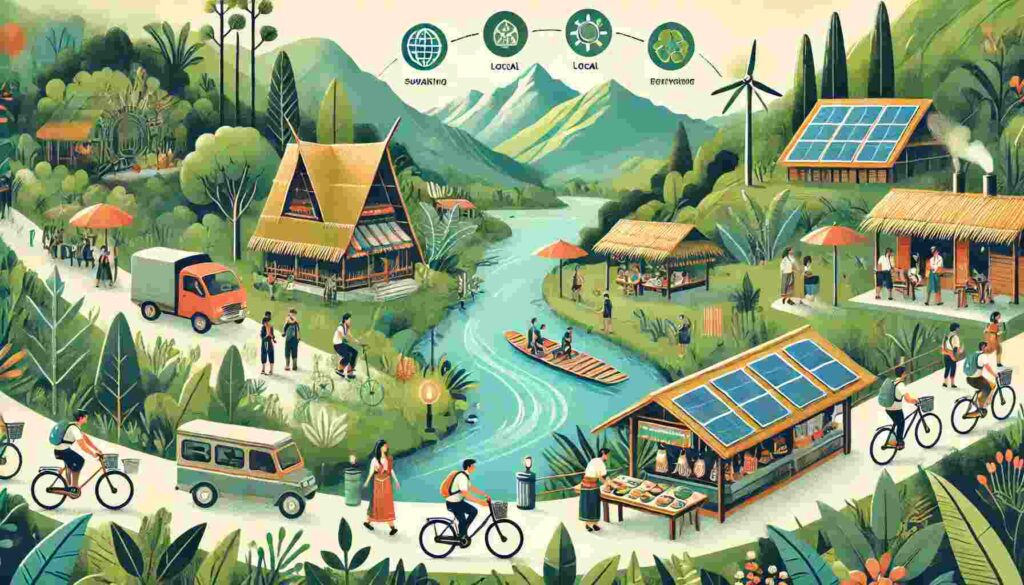Traveling is the best way to learn about new cultures, meet people from other countries, and discover the natural beauties of the world. Yet, how we travel can have a big impact on the planet and on which communities benefit from travelers. This is where eco-travel comes in. Eco-friendly travel, or sustainable tourism, is a way to break away from this trend and find meaningful experiences with local culture while reducing our collective carbon emissions.
Why Eco-Travel is the Best Way to Experience Local Culture This blog post will discuss eco-travel, why it matters for travelers and local communities alike, and what you stand to gain from becoming a more sustainable traveler through this type of travel. It will also offer tips on how to be a sustainable tourist while fully partaking in the experience.
What is Eco Travel?
Eco-travel is also called responsible, sustainable, or green travel. It means traveling in a way that minimizes the ecological impact of your visit while maximizing the benefits for local communities. It is centered around producing as little waste as possible, preserving the environment, and spending money locally while giving you very real encounters with life and culture in the areas you are visiting.
First and foremost, the essence of eco-travel aims to get us to admire and respect the environment and culture of those places we visit in a win-win.
Why Eco Travel is the Best Way to Experience Local Cultures
Supporting Local Communities
Traveling eco-consciously supports local communities. It promotes staying in independently owned accommodation, eating at restaurants that source locally produced food, and buying from small, locally owned businesses. This way, you contribute to the region’s economy and protect its traditional heritage.
While it may be tempting to stay at one of the international hotel chains and eat at one of the few restaurants that cater to tourists, you will experience an essential trait for traveling in local businesses…Authenticity. Mass tourism rarely provides access to the community traditions, foods, and ways this research does.

Cultural Immersion
How does slow travel visiting a tourist site and moving to the next one in 2 minutes sound? Governments urge travelers to immerse themselves in traditional customs by attending festivals or engaging in living-style activities (cooking/farming/crafting) with locals.
When you spend more time in one place and among locals, you can experience their lifestyle, customs, and traditions. You will gain a deeper understanding and experience more of the culture than just passing by a few landmarks.
Protecting Cultural Heritage
Citing a report from the UN’s cultural body, they said mass tourism puts many of the world’s most cherished traditional cultures at high risk. Over-commercialization tends to strip many locations of their artistic core. Eco-travel, by contrast, appeals to our cultural heritage and places much more emphasis on respecting and preserving it.
If eco-friendly tours or organizations that protect a place’s culture are supported, future generations can continue to experience its distinct culture. Such activities might include those that support the preservation of historical sites, the development of traditional crafts, or the protection of native knowledge and practice.
Unique Local Experiences
Of course, one of the beautiful virtues of eco-travel is that it also offers a window into experiences, unlike blockbuster destinations. Instead of sticking with standard tourist hotspots, eco-travel has you exploring places that have not been overrun and seeing fewer visitors.
That could be a visit to a village where local artisans work, a hike up the hill with a local guide recounting tales of history, or attending an event outside regular tourist hours.
Sustainable Interactions with Nature
Local cultures are often closely connected to their natural environment. By practicing eco-travel, you’re not only experiencing the culture but also engaging with the natural surroundings in a responsible way. This might include activities like eco-friendly wildlife tours, hiking, or staying in eco-lodges that are designed to minimize their impact on the environment.
These experiences can provide you with a better appreciation for the landscapes, animals, and plants that are integral to the local culture. You’ll also help ensure that these natural environments are protected for future generations.

How to Travel Sustainably and Experience Local Cultures
Now that you understand the benefits of eco-travel, here are some tips on how to travel sustainably and immerse yourself in local cultures:
Choose Eco-Friendly Accommodations
When booking a visit, do your best to find accommodations that focus on sustainability. Eco lodges, guest houses, and local hotels often try to be as sustainable as possible because the owners feel a stronger bond with the place they live/ visit. They also tend to buy food closer to home, hire local workers, and use alternative energies and water-saving methods—even installing solar-powered lights inside the ashram forest.
Eat Local and Organic Food
No culture is complete without food. If you want a taste of happiness, choose smaller, organic, or locally sourced restaurants to try the local food. You’ll not only be handing over some $$ to your local farmer and business owner, but it’s also an opportunity to taste authentic dishes that are often hand-me-down generational recipes.
You can even learn to cook traditional meals and enjoy food tours that show you how they are made in a few places. This provides you with a local dining experience.
Respect Local Customs and Traditions
Respect the Culture: One of the most significant aspects of eco-friendly travel is respecting other cultures. Learn about the customs, dress codes, and social norms of anywhere new you travel! Respect sacred places or sites and people, and always ask for permission before photographing them. Learn a few words in their language.
If you have good manners and respect the local culture, your travels will be much more prosperous, and people from that place will probably like that you do things their way.
Choose Local Guides and Tours
Hire local guides for your tours and other activities whenever you can. Local guides are often well-versed in the heritage and history of their area and its natural world. They can provide insights and stories that you will not find in a mass-produced guidebook or from a large tour operator.
Using local guides also means the money stays in the community rather than going to some outside company. This allows the support of local businesses and preserves the cultural experience in its purest form.
Limit Your Use of Resources
Being an eco-friendly traveler means being mindful of your resource consumption. Conserve water and energy by turning off lights, air conditioning, and heaters when you leave your accommodation. Avoid using single-use plastics by carrying a reusable water bottle, utensils, and shopping bags. These small actions can make a big difference in reducing your environmental footprint.
Use Public Transportation or Walk
Instead of renting a car or taking taxis, consider using public transportation or walking to get around. Not only is this better for the environment, but it also gives you a chance to see more of the local area and interact with people.
Walking through local neighborhoods or taking a bus with locals allows you to observe daily life and can lead to spontaneous conversations and cultural exchanges.

The Long-Term Benefits of Eco Travel
Going green is a lot more than having a fun trip. It’s about crafting sustainable outcomes for a locality that includes both the visitors and the places visited. Sustainable tourism protects the diversity of natural and cultural wonders while conserving resources, heritage, and culture for future generations.
Eco-tourism is an industry that provides jobs, helps to protect cultural and natural heritage, and leads to economic growth in local areas. As a result, when travelers engage with the culture and environment authentically and respectfully, they get a more profound experience.
If you make the best choice of eco-travel, you will make your identity more than just a tourist; you will also become a steward of the planet and a supporter of local communities. Wildlife protection programs benefit massively from people who want to contribute.
Conclusion
Eco-travel is more than just a trend; it’s a responsible way to explore the world while making a positive impact. By embracing sustainable travel practices, you can connect more deeply with local cultures, support communities, and protect the environment. Whether you’re exploring a remote village or an urban landscape, eco-travel allows you to experience the world in a way that is both enriching and respectful.



